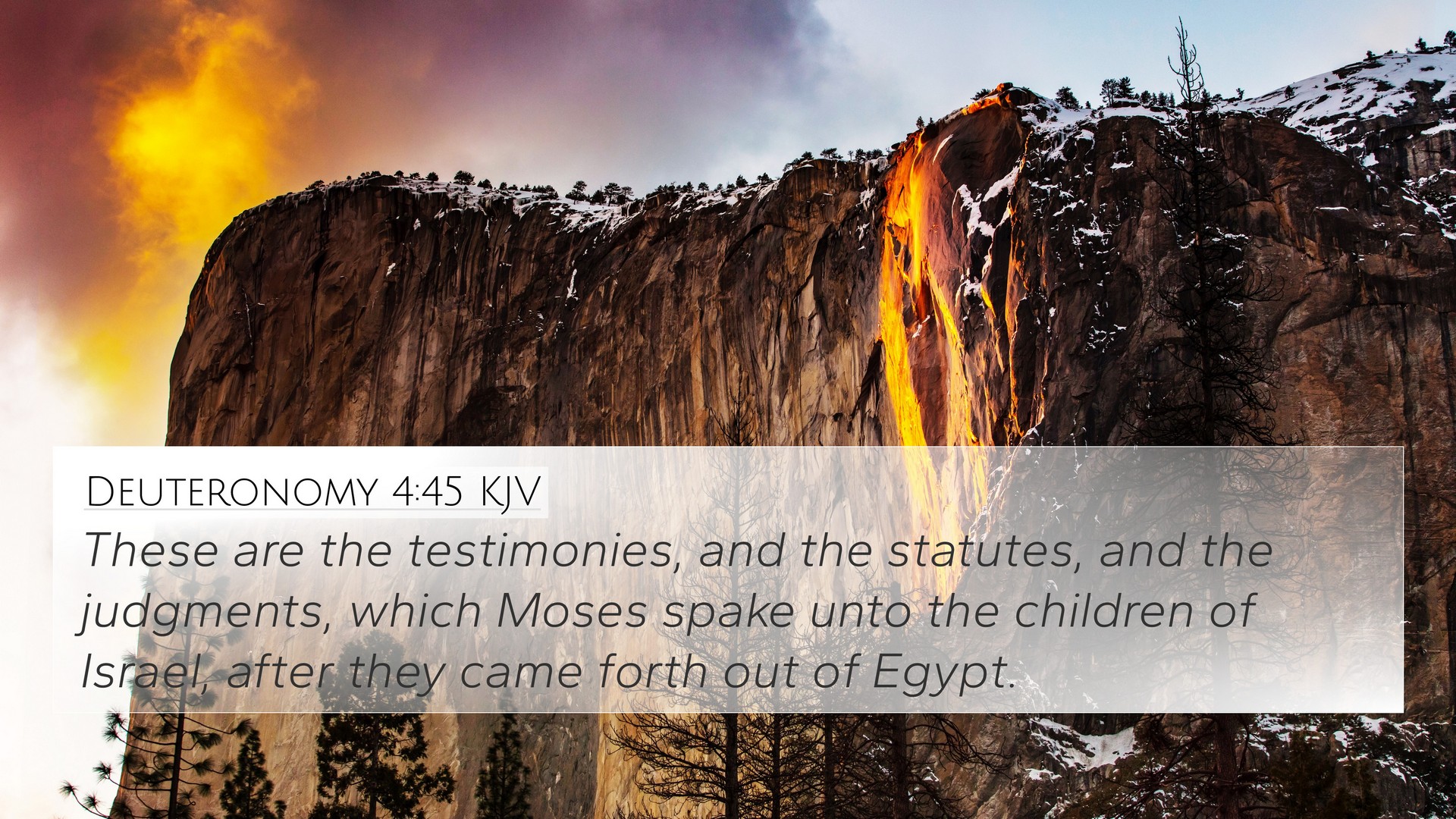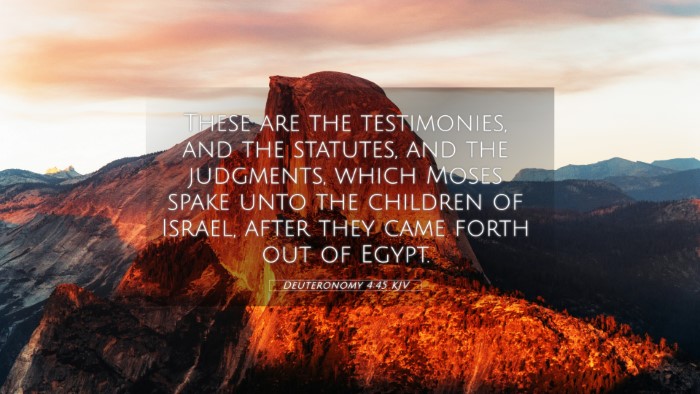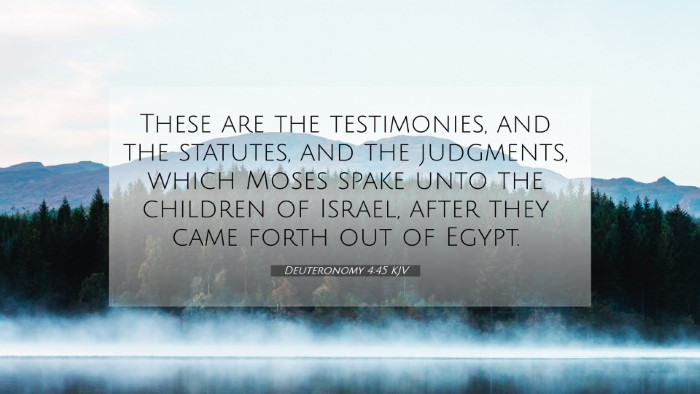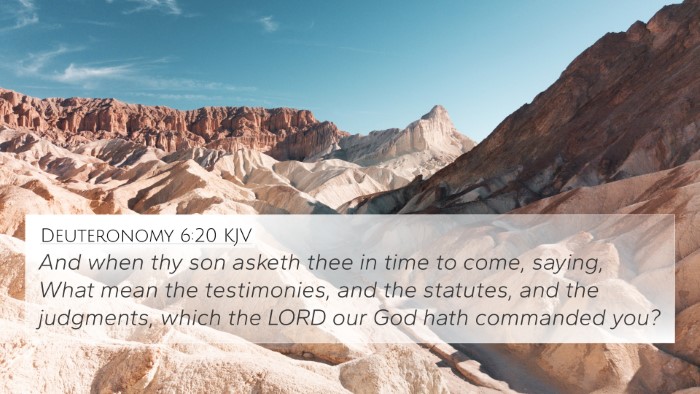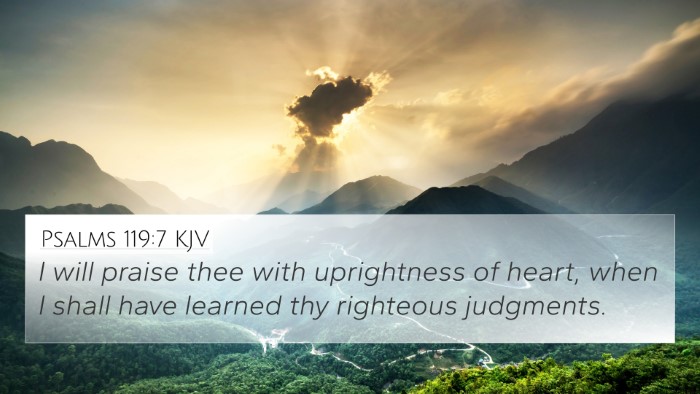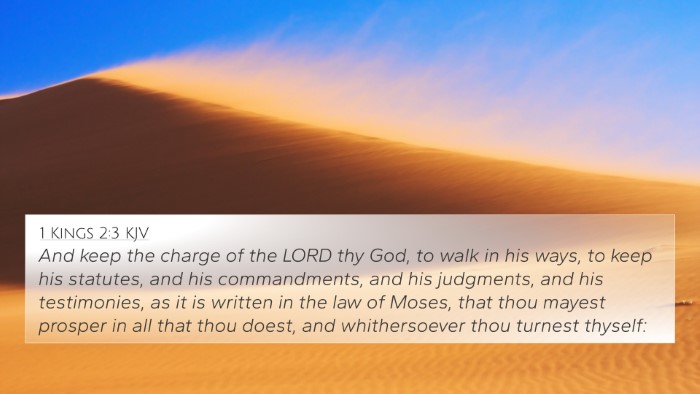Understanding Deuteronomy 4:45
Bible Verse: Deuteronomy 4:45 - "These are the testimonies, and the statutes, and the judgments, which Moses spake unto the children of Israel, after they came forth out of Egypt."
This verse serves as a summation of the legal and moral code that Moses is about to present to the Israelites. Its significance lies in the context of Israel's history and the setting of the covenant between God and His people.
Commentary Insights
Matthew Henry's Commentary
Matthew Henry emphasizes that this verse reinstates the foundation upon which the Israelites must build their society. It underscores the importance of understanding and adhering to God’s commandments as central to their identity. According to Henry, the statutes and judgments are critical for the community's integrity and moral compass.
Albert Barnes' Notes
Albert Barnes expands this idea by linking it back to the deliverance from Egypt. He notes that the laws given are a response to God's salvation, suggesting that compliance to these laws is a form of gratitude and acknowledgment of God’s sovereignty and mercy. Barnes also points towards the structure of these laws as a means for the Israelites to establish themselves as a separate nation dedicated to God.
Adam Clarke's Commentary
Adam Clarke draws attention to the educational aspect of this verse. He points out that Moses is not merely giving commands; he is teaching the Israelites the importance of these laws in everyday life. Clarke notes the repetitious design of the law that serves to engrain these teachings into the hearts and minds of the people, ensuring long-term adherence and understanding.
Thematic Connections
Deuteronomy 4:45 is deeply connected to various themes that resonate throughout the Bible. Below are some significant thematic Bible verse connections:
- Exodus 20:1-17: The Ten Commandments echo the statutes and judgments mentioned.
- Psalm 119:1-2: A celebration of those who walk in God’s law, paralleling the call in Deuteronomy.
- Isaiah 1:10: God’s invitation to Israel to heed His laws, reinforcing the importance of obedience.
- Matthew 5:17-19: Jesus affirms the lasting relevance of the law, linking Old Testament commandments to New Testament teachings.
- James 1:25: The emphasis on being doers of the word connects directly with the call to obey the statutes.
- Romans 2:13: The principle that hearing the law is not sufficient, but doing it resonates with the intent of Deuteronomy 4:45.
- 1 John 5:3: Loving God through obedience to His commandments reflects back to the statutes mentioned.
Cross-Referencing Biblical Texts
This verse serves as a pivotal point for cross-referencing various other Scriptures, creating a rich tapestry of inter-Biblical dialogue. Here are additional verses that relate to Deuteronomy 4:45:
- Leviticus 26:46: Discusses the laws as part of a covenant, reinforcing the significance of obedience.
- Joshua 1:7-8: The call to meditate on God's law aligns with the statutes presented.
- 2 Timothy 3:16-17: The inspiration of Scripture and its usefulness springs from the same foundational truths.
- Hebrews 8:10: The covenant written in hearts relates to the internalization of these statutes.
Conclusion
Deuteronomy 4:45 encapsulates the essence of obedience to God’s law as vital for the Israelites after their liberation from Egypt. Through the insights drawn from the commentaries of Matthew Henry, Albert Barnes, and Adam Clarke, we find a multifaceted understanding of this verse that encourages both contemporary readers and believers to engage with God's commandments deeply. The thematic and cross-referenced connections position this verse within a broader narrative of scriptural fidelity and spiritual growth.
